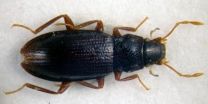Searching the web for dengue
Study shows Internet search queries can help monitor epidemics in developing countries; produces new Internet tool that could speed public health responses to tropical diseases
2011-06-01
(Press-News.org) Boston, Mass. – Researchers at Children's Hospital Boston and Google.org have found web-based search data to be a viable source of information for early detection and monitoring of outbreaks of dengue, an emerging mosquito-borne virus found in tropical areas of the world. Because search data allows the capture of disease-related queries in near real time, it could help public health officials in the more than 100 countries affected by dengue respond more quickly to nascent epidemics.
A team from the Children's Hospital Informatics Program (CHIP), led by John Brownstein, PhD, together with collaborators at Google, published these findings today in the journal PLoS Neglected Tropical Diseases. An online tool developed by the researchers based on the findings is now available at http://www.google.org/denguetrends.
The team's work on the dengue tool – which tracks epidemics of dengue using web search results provided by Google – shows that, when compared against available national surveillance data, web-based search data is a viable, rapid source of information for early detection and monitoring of dengue outbreaks.
"By using search data, we're tapping into a freely-available, instant dataset that can be gathered, analyzed, and released much more quickly and at much lower effort and cost than through traditional national surveillance and reporting programs," said Brownstein, director of the Computational Epidemiology Group in CHIP and co-developer of the HealthMap and related DengueMap global disease surveillance systems. "The kind of information the tool provides can help direct public health officials target interventions aimed at mosquito control and disease prevention, such as education campaigns, as early as possible.
"This information can act as a supplement to traditional surveillance and reporting systems and give local authorities a leg up on an outbreak," he said.
Dengue is endemic to countries in Asia, Africa, the Pacific, and the Americas. A relatively recent disease in humans – it only entered our species in the last 100 to 800 years – it infects about 500 million people every year; 55 percent of the global population is currently at risk of dengue infection.
"Dengue affects large numbers of people," continued Brownstein, "but because it is endemic in many countries, it is not a disease where search data would be affected by panic-induced searching or a lot of 'noise.'"
The research team selected Bolivia, Brazil, India, Indonesia, and Singapore as the basis for their study because each has a sufficient level of endemic dengue transmission to provide baseline data, a large base of Internet users, and national data collected via passive reporting or sentinel site surveillance against which to assess the tool.
The dengue tool follows the methodology of Google Flu Trends, an application developed by Google and the US Centers for Disease Control and Prevention that mines web search data for patterns that can help public health officials get an early jump on seasonal flu epidemics.
###
Children's Hospital Boston is home to the world's largest research enterprise based at a pediatric medical center, where its discoveries have benefited both children and adults since 1869. More than 1,100 scientists, including nine members of the National Academy of Sciences, 12 members of the Institute of Medicine and 13 members of the Howard Hughes Medical Institute comprise Children's research community. Founded as a 20-bed hospital for children, Children's Hospital Boston today is a 395 bed comprehensive center for pediatric and adolescent health care grounded in the values of excellence in patient care and sensitivity to the complex needs and diversity of children and families. Children's also is the primary pediatric teaching affiliate of Harvard Medical School. For more information about research and clinical innovation at Children's, visit: http://vectorblog.org.
END
ELSE PRESS RELEASES FROM THIS DATE:
2011-06-01
A European research team, with Spanish participation, has described two new beetle species measuring two millimetres in length. The coleoptera (beetles) were found in streams in the Pyrenees and Pre-Pyrenees mountains (from Gipuzkoa to Girona) and in the Sierra de la Demanda mountains (Burgos). Experts had previously thought that they belonged to another European species.
"These species, which have a restricted range, had been confused with another European species with a more extensive distribution (Hydraena saga) and so their independent evolutionary history was unknown", ...
2011-06-01
MadCap Software, Inc. (http://www.madcapsoftware.com), the leader in multi-channel content authoring and a showcase company for Microsoft Visual Studio and Microsoft XPS, today announced that revenues for Q1 2011 have grown 41% over Q1 2010, continuing the profitability that the company has enjoyed since launching its flagship product Flare in 2006. In the wake of strong growth, MadCap has increased its cash and accounts receivable by 30% over the same period ending 2010. At the same time, MadCap continues to invest in resources by expanding headcount by 21% over the previous ...
2011-06-01
Research from North Carolina State University shows that so-called biodegradable products are likely doing more harm than good in landfills, because they are releasing a powerful greenhouse gas as they break down.
"Biodegradable materials, such as disposable cups and utensils, are broken down in landfills by microorganisms that then produce methane," says Dr. Morton Barlaz, co-author of a paper describing the research and professor and head of NC State's Department of Civil, Construction, and Environmental Engineering. "Methane can be a valuable energy source when captured, ...
2011-06-01
Bethesda, MD—Severe deficiency of the vitamins and minerals required for life is relatively uncommon in developed nations, but modest deficiency is very common and often not taken seriously. A new research published online in the FASEB Journal (http://www.fasebj.org), however, may change this thinking as it examines moderate selenium and vitamin K deficiency to show how damage accumulates over time as a result of vitamin and mineral loss, leading to age-related diseases.
"Understanding how best to define and measure optimum nutrition will make the application of new technologies ...
2011-06-01
TORONTO, Ont., May 31—Female prisoners who did not participate in a drug treatment program after their release were 10 times more likely to return to prison within one year than other prisoners, a new study has found.
More than one-third of those women were sent back to prison within six months, according to the national study led by Flora Matheson, a medical sociologist at St. Michael's Hospital.
The findings, published in the June issue of the American Journal of Public Health, underline the importance of post-release treatment programs for prisoners with substance ...
2011-06-01
What would it take to make a manned mission to Mars a reality? A team of aeronautical and textile engineering students from North Carolina State University believe part of the solution may lie in advanced textile materials. The students joined forces to tackle life-support challenges that the aerospace industry has been grappling with for decades.
"One of the big issues, in terms of a manned mission to Mars, is creating living quarters that would protect astronauts from the elements – from radiation to meteorites," says textile engineering student Brent Carter. "Currently, ...
2011-06-01
In the online version of the New England Journal of Medicine, physicians and scientists in Heidelberg, Montreal, and Paris reported on the successful treatment of three young children who were suffering from a severe hemolytic-uremic syndrome (HUS) after an infection with enterohemorrhagic Escherichia coli (EHEC). The infections occurred in 2010. EHEC are the bacteria that cause the current wave of infections that have already claimed ten lives in Germany. The number of suspected and confirmed cases of EHEC has now reached 700.
Eculizumab has been approved in Germany ...
2011-06-01
Farin Innovations, Inc. a Miami, FL-based company, is giving away 1 free logo every 2 weeks until June 30, 2011!
If you are interested in a free custom logo for your business, enter before it's too late. It's 100% free!
If you don't have a website, this is a great opportunity for you to get off to the right start. Your logo is the key to the castle, responsible for creating a lasting first impression on your visitors.
Visit the link below, click on the promotion, and proceed to enter to win a free custom logo every 2 weeks until June 30, 2011:
http://www.farininnovations.com/news/press-releases/farin-innovations ...
2011-06-01
WINSTON-SALEM, N.C. – May 31, 2011 – The gold standard long-term glucose monitoring test for patients with diabetes proved to be of limited value in dialysis patients, according to a new study at Wake Forest Baptist Medical Center.
The study appears online in the Clinical Journal of the American Society of Nephrology and is scheduled for the July print issue.
Blood sugar monitoring is a vital part of diabetes management. Patients and physicians rely on the hemoglobin A1c (HbA1c) test to measure an individual's average blood sugar level over the prior three months. ...
2011-06-01
Bethesda, MD—If you are one of the millions of people around the world who struggle with dry eye disease, good news is on the way. A new research discovery published in the Journal of Leukocyte Biology (https://www.jleukbio.org) offers hope for new drugs that treat the cellular cause of the disease rather than its symptoms. That's because the research is the first to identify natural killer (NK) cells, a type of cell that provides innate immunity to the eyes, as promoting the inflammation that plays a critical role in the development of dry eye disease.
"Dry eye disease ...
LAST 30 PRESS RELEASES:
[Press-News.org] Searching the web for dengue
Study shows Internet search queries can help monitor epidemics in developing countries; produces new Internet tool that could speed public health responses to tropical diseases



